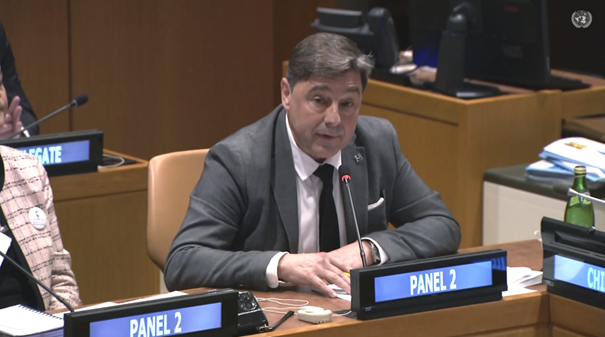CICOPA’s position on a UN resolution on SSE for sustainable development
22 December 2022
CICOPA’s position on the future UN recommendation on Social and Solidarity Economy for sustainable development; CICOPA president speaks about cooperatives and SDGs at the UNHQ in New York
In 2022, a group of UN Member States expressed interest in proposing a UN General Assembly Resolution on Social and Solidarity Economy (SSE) for sustainable development. A coalition of states has been created to work on the resolution.
In the context of a future UN resolution on SSE for sustainable development, CICOPA calls national governments to:
- Recognize the worker-ownership as an employment relationship characterized by quality and promoted in national employment policies. Legal frameworks should be foreseen for the establishment of worker cooperatives.
- Adopt legislation regulating cooperatives in which the primary and direct purpose is the delivery of services of general interest, such as social services, work integration of disadvantaged workers, culture, education, transport, energy etc.
- Provide legal, political and financial support for social cooperatives, since they contribute significantly to work and social integration of the most disadvantaged citizens
- Provide an appropriate legal, political, and financial support for cooperatives active in the care sector since the cooperative model is a good solution for the provision of quality care, quality working conditions for carers, and for addressing diverse socio-economic inequalities associated with care so that it is available even to the most disadvantaged citizens in the most remote regions.
- Adopt adequate legal frameworks enabling the establishment of cooperatives of independent workers/producers (freelancers, self-employed etc.) since they allow the latter to combine flexibility with security and mutualization
- Create and/or adjust specific investment support tools for cooperatives, make other tools fully accessible (e.g. funds for SMEs), ensure full participation of cooperatives in national funding programs, provide support for long-term capital investments and members’ capital investment in cooperatives, provide special support and access to finance for cooperatives in remote and rural areas. In addition, awareness-raising among financial institutions toward the cooperative model which is often discriminated against in access to loans due to its cooperative nature (where capital is not remunerated, and the governance is democratic).
- Promote and support the establishment cooperatives in emerging industries and digital economy as crucial actors to put innovation and technology at the service of the community and to improve the working conditions, such as for the workers in the platform economy, often characterized by poor working conditions and access to social protection and rights.
- Include policies to support staff qualification and upskilling to help cooperatives to cope with challenges arising from technological, digital and green transitions.
- Provide support for innovation in cooperatives and improved access to wider innovation eco-systems
- Provide legislative frameworks and support measures for the transfer of companies to workers and workers buyouts in the form of worker cooperatives, since they save viable economical activities and jobs
- Put in place capacity building strategies, toolboxes, specific diagnostic tools for green transition of cooperatives, especially those active in energy-intensive sectors. Specific relief and emergency measures are necessary to help cooperatives to cope with high energy prices.
- Level playing field for cooperatives in all policies (entrepreneurship, taxation, access to finance, etc.) should be guaranteed so that they do not face any discriminatory attitudes from administrations
- Promote cooperative education and training at all levels of the educational systems
- Promote the role of cooperatives in transforming informal economy activities into formal ones
On December 13th, 2022, CICOPA president Iñigo Albizuri Landazabal took part in a UNTFSSE discussion dedicated to the future UN recommendation on Social and Solidarity Economy for sustainable development. During his intervention, he pointed out that one of the main worker cooperatives’ contributions to Agenda 2030 is that of employment, as they provide decent employment, and through employment they can reduce inequalities and disparities. Thus, cooperatives ensure better distribution of wealth at its origin, diminishing the need to address social and economic issues caused by capitalistic methods of work organization.
The UN Inter-Agency Task Force on Social and Solidarity Economy (UNTFSSE), founded in 2013, aims to raise the visibility of Social and Solidarity Economy (SSE) within the UN system and beyond. The UNTFSSE published in September 2022 the “UNTFSSE Position Paper: Advancing the 2030 Agenda through the Social and Solidarity Economy”. This position paper explores the role SSE can and should plan in achieving the Sustainable Development Goals (SDGs). It also calls environments and policy frameworks that enable the SSE to thrive. This event follows in the path of other UN-level initiatives to establish the basis for a UN resolution on SSE for sustainable development.
CICOPA will continue to participate and contribute to the elaboration of a UN resolution on Social and Solidarity Economy for sustainable development.

